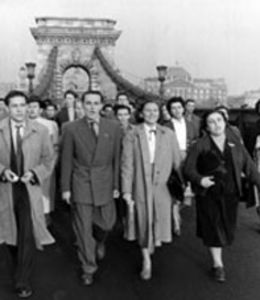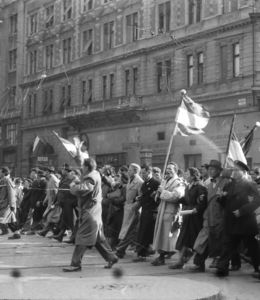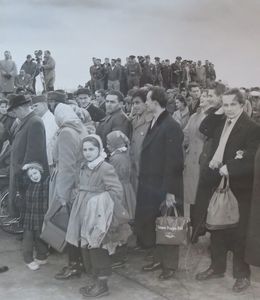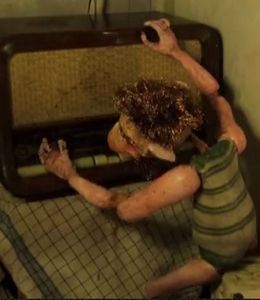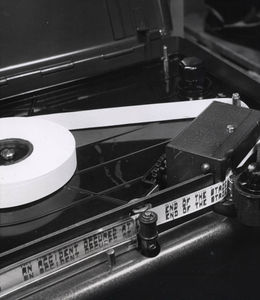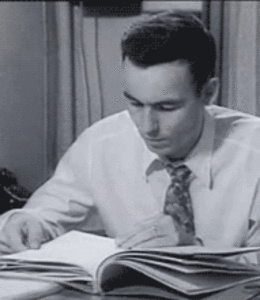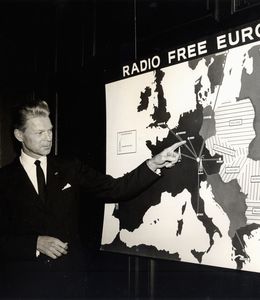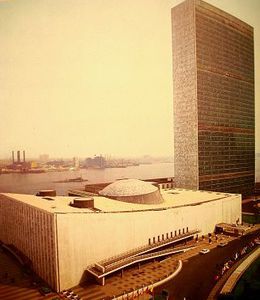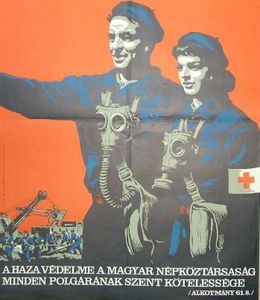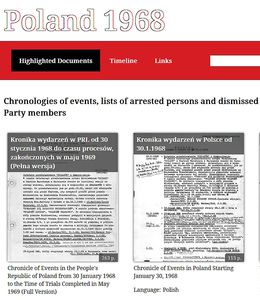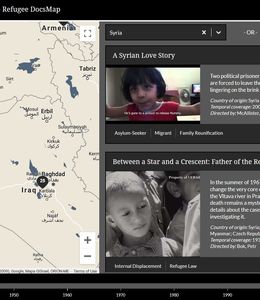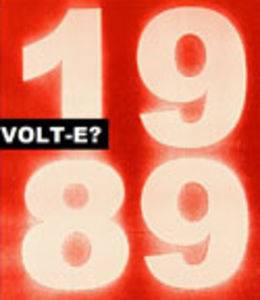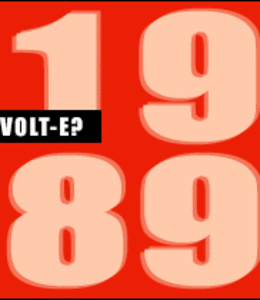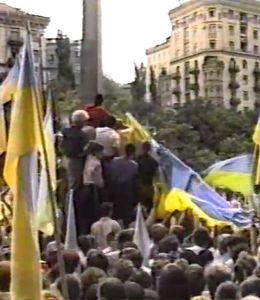1956 Digital Archive
The 1956 Digital Archive is a collection of English-language text documents, photographs, and films on the 1956 Revolution in Hungary and its reception abroad. It brings together and contextualizes materials held across different institutions, including the unique set of Columbia University Research Project on Hungary (CURPH) interviews made with refugees in camps in 1957-1958, and some of the CIA’s declassified files on the Hungarian revolution. |
1956 Digital Collection
This new thematic digital repository brings together not yet published or lesser known sources on the 1956 Hungarian revolution, as well as previously digitized and published documents from Blinken OSA and its partner institutions. From the 13 collections presented here, the most notable novelties are the Hungarian broadcasts of Radio Free Europe, a digitally remastered, 47 minute Ministry of Interior film found recently at a police training facility, and over 1,000 photos from the Fortepan Amateur Photo Archive. |
1956 Hungarian Refugees in the United States
In 2016 with the generous support of the Blinken family, the archives extended the scope of its research to other archives in the United States that also possess relevant, still largely unexplored records on the 1956 Hungarian refugees. The Blinken OSA is now making these recently revealed and digitized records available online for scholars and the wider public in both Hungarian and English. |
Curated Collection on Hungarian Cold War Theater from the Archives of Radio Free Europe
The curated collection is a significant compilation (approximately 1,400 pages) on the theaters in Hungary from the database of the Radio Free Europe. The freshly published selection comes from the radio's Munich and New York offices, the former containing personal files and the latter containing theater related elements from country-specific thematic folders. Personal files mostly consist of excerpts from articles in Hungarian, while the New York office files contain reports, summaries, and abstracts in English. The collection adds important details to the understanding of the cultural history of the Cold War in general and makes previously unknown sources about the history of the Sovietized Hungarian theater and its Western reception, freely accessible to all researchers and anyone interested through an easily searchable webpage. |
Czechoslovakia 68/08
This curated collection features the news output of Radio Free Europe’s Central News Room during the first three weeks of the 1968 invasion of Czechoslovakia, photographs of the Central News Room in full operation, a set of photos of the Soviet troops moving into the town of Košice, and a rare collection of leaflets and other original documents circulated across Czechoslovakia during the invasion. |
Digital State Security Archive
Hungarian-language textual and audiovisual records requested by members of the public from the former state security and secret police archives, and digitized and published by OSA. Our aim is to unite the fragmented, scattered, and often artificially separated files to give a full picture of the activities and culture of former state security organs. |
Free Europe Committee/Radio Free Europe - Encrypted Telex Communication 1953-1973
The digital series, ‘Free Europe Committee/Radio Free Europe - Encrypted Telex Communication’ between the Free Europe Committee (FEC) in New York and Radio Free Europe (RFE) in Munich is an important part of the Free Europe Committee collection. The aim of this project is to combine the archivist’s work with the new possibilities offered by modern science and information technology to process, describe, manage, organize, interpret, and visualize more than 20 years of intermingled history of the FEC and RFE during the Cold War. So far more than 56 000 documents from the period 1953 – 1973 have been “cleaned”, processed, and published for researchers. |
Héderváry Collection
Documents on the activities of the UN Special Committee on the Problem of Hungary, 1957-1963, including primarily English-language reports, memoranda and correspondence, as well as audio recordings of Hungarian witness testimonies given before the Committee. |
Paranoia Recycling
A collection of rare late 1960s Hungarian educational films, dubbed into English, on ABC (Atomic, Biological, and Chemical) warfare, from our larger collection of educational and propaganda films from the Cold War period. Background documentation is also provided on the production of the films. Part of OSA's effort to preserve and present rare and deteriorating material stored on obsolete media. |
Poland 1968 Digital Collection
This unique selection of documents from the records of the Radio Free Europe/Radio Liberty Research Institute focuses on the March 1968 Polish student rebellion and its aftermath, including the political trials that followed it and the anti-Semitic campaign that led to the emigration of roughly 13,000 Polish Jews. The 2,500 documents presented here include the Monitoring of the Polish Radio and Television, Polish and foreign press clippings, as well as other Radio Free Europe materials like telegrams, situation reports and press surveys. |
Refugee DocsMap
Refugee DocsMap is a visual geographic catalog of 600+ recent documentary films on the global experience of forcibly displaced people, who had to leave their countries due to uprisings against tyranny and state sponsored violence, wars and ethnic or religious conflicts. The collection aims at bringing the personal, unique story of refugees and asylum seekers at the forefront of the inquiry, in order to inform and diversify contemporary public discourse on them. |
Was There a 1989?
Hungarian-language texts, news, films, sound and photos chronicling the transition in Hungary and the region. This collection presents multiple perspectives, placing differing accounts of events side by side, as they unfolded. |
Will There Be a 1989?
Text, photo, film, sound and object photo chronicling the democratic transition in Hungary. By placing different accounts of events side by side, as they unfolded and recorded in various sources, this collection presents multiple perspectives of 1989. Renewed in 2019, the Joseph Pulitzer Memorial Award winning curated collection has been amended with newly acquired and digitized documents, including video materials of the Black Box Foundation, Radio Free Europe (RFE) transcripts by István Kemény, documents of the Budapest Reform Circle Movement of the Hungarian Socialist Workers’ Party, as well as sound recordings of Hungarian programs of RFE and BBC, and photos of Piroska Nagy and the Deutsche Kinemathek. |
Winning Freedom: Ukraine 1989-1991
This curated collection dedicated to Ukraine explores three years of struggle for independence, presenting key events in this process: glasnost, social movements, student hunger strikes, political transformations, economic collapse, mass strikes and rallies, and much more. We have selected a diverse, yet representative, fraction, to provide readers with a comprehensive understanding of what kind of documents make up our collection. Based on the documents, we demonstrate how the political course and rhetor in the country transformed, and how the desire for independence of Ukraine acquired a massive, national character. |


